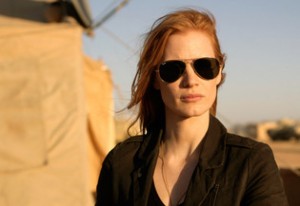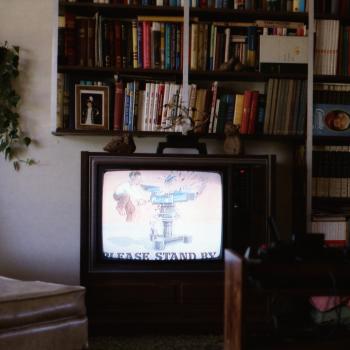 A few nights ago, after Jess and the kids were in bed, I finally bit the bullet and watched Kathryn Bigelow’s film Zero Dark Thirty. I’ve been dreading it. Avoiding it.
A few nights ago, after Jess and the kids were in bed, I finally bit the bullet and watched Kathryn Bigelow’s film Zero Dark Thirty. I’ve been dreading it. Avoiding it.
As I settled into the couch and pressed play on the DVD remote, metallic thunder began rolling and echoing through the woods around our house. The cats bolted from the couch where they had been sleeping into the basement and the living room windows rattled—perfect foreshadowing for my mood, a leaden feeling borne of the understanding that watching Zero Dark Thirty would likely dredge up a lot of feelings and thoughts that I have been working hard to repress.
My book A Good War is Hard to Find: The Art of Violence in America meditates on American attitudes toward violence in the aftermath of 9/11 and the Abu Ghraib prison scandal. The occasion for the book is the photos of abuse taken by military police and shared via the web, photos that tipped us off that something larger and more coordinated than a few sadistic individuals satisfying their dark needs was happening outside the photos’ frames.
In all, I spent about eighteen months immersing myself in the research and literature on violence, torture, and photography. I have never and may never again read so much in such a short period of time. Time was of the essence. The publisher wanted it immediately, so I devoured histories, sociological and psychological case studies, Marxist intellections on the inexpressibility of pain—how torture can “unmake” the world around us. I read prison narratives, and novels, I watched documentaries, and read journalistic accounts of war and atrocity from the Peloponnesian War to the on-going War on Terror.
The thread running through all of those depictions was how violence meted out on another person or people becomes a source of pride and power for the aggressor and shame and impotence for the victim. Violence begets violence. Shame begets more shame.
Setting aside the very real and pressing issue of balancing national security and trying to occupy the moral high ground, the problem that I perceived even through the joy and pride I felt at the publication of the book was that nothing was likely to change; it would not interrupt the cycle of violence that I was witnessing.
I wanted to achieve change. That’s what those first writers who fired my imagination had done. Writers like Flannery O’Connor, James Baldwin, Richard Wright, and Ralph Ellison taught me that depicting bigotry and violence performed a kind of exorcism—called it out, named it, showed its destructive, self-perpetuating legacy.
And yet I believe that art is not magic, it alone can do nothing. “Art is,” as Oscar Wilde writes in the preface of The Picture of Dorian Gray, “quite useless.” But that doesn’t mean art is ineffectual. Though it fulfills no biological need, at least that we know of, it often aids our understanding and appreciation of the world by presenting us with a copy that is different, enlarged usually, in some key way. When a singer suddenly erupts in an aria at the tragic climax of the opera she, if she is good, has likely caused us to feel that pain more deeply, more exquisitely.
There are surprisingly few exquisite moments in Zero Dark Thirty. There is a lot of yelling and cursing. A lot of f-bombs are dropped to convey the toughness of our tough folks who work behind the scenes to keep us safe. Maya (Jessica Chastain) must shout at a superior to get the resources she needs to capture bin Laden. What’s weird is that when all the yelling dies down, you realize that what you’ve witnessed isn’t all that fraught with high stakes moral ambiguity. Maya is no longer the reticent by-the-book agent; she is now a feisty, redheaded Ahab whose whale is bin Laden (known by the snappy acronym “OBL”).
There’s no discussion of OBL’s strategic value, or of any end game other than let’s kill this bastard. And who’s going to stand in the way of a hot chick with a bad case of bloodlust? What red-blooded patriot isn’t going to say, “Uh, yes, please. Do you mind if I watch?”
And what do you know? We do get to watch. And even though we know what happens next—OBL is found by members of Seal Team 6 in an upper-room of his compound and shot through the head—the suspense is agonizing. Screaming women (the wives of OBL’s henchman?) are killed trying to save their husbands from being shot. The crisp thwup of assault rifles is followed by the mewing cries of horrified children. The soldiers try to calm them in that reassuring way that only Americans have: “It’s OK. It’s OK. It’s OK.”
As the credits rolled, I felt a strange and deep need to read my own book. It feels icky admitting this, but the yearning was not vanity as much as a sudden need to be reunited with a part of myself that I had become estranged from. After several minutes of scanning the bookshelves, I realized I didn’t even have a copy in the house; the few I have left are in my new office, yet to be unpacked.
Staring into the glowing screen of my laptop, I began trying to recapture that original sense of outrage, putting down little notes-to-self that I had stored while I watched the film. No female CIA operative has ever shown up to assist in the brutal interrogation of a terrorist inside a sweltering corrugated metal shed wearing a tailored crushed-velvet blazer. On and on I wrote, angrily jabbing at the keyboard until I had filled most of a page.
Then the strangest thing happened: this literary shadow boxing hadn’t made me feel any better. Archly and self-righteously complaining about the film’s gender issues and failure to critique and analyze the moral complexities of an endless, clandestine war against a caricaturized enemy was only making me feel worse.
The anger and sadness that I had (or thought I had) successfully channeled into the writing of my first book seemed to have taken root in me and was now garishly blooming. Sitting there in the dark, the storm flashing and booming all around me, I felt consumed by the thought that the violence would never stop; it would continue ad nauseam. My soul felt darkened, tainted.
In the days that have followed, I’ve been wondering whether I might have done some permanent damage. Part of me wants to un-see, un-read, un-know; throw back up all that I ingested during those eighteen months.
Nonstop I’ve been praying the psalm, O Lord, give me a blank slate. Create in me a clean heart.
No word yet, though I think I know what I’ve been doing wrong. I haven’t been singing it.
David Griffith is the author of A Good War is Hard to Find: The Art of Violence in America (Soft Skull). He teaches creative writing at Sweet Briar College in Virginia where he lives with his wife Jessica Mesman Griffith and children, Charlotte and Alexander. His essays and reviews have appeared in Image, Utne Reader, The Normal School and online at killingthebuddha.com. He blogs at Pyramid Scheme.















